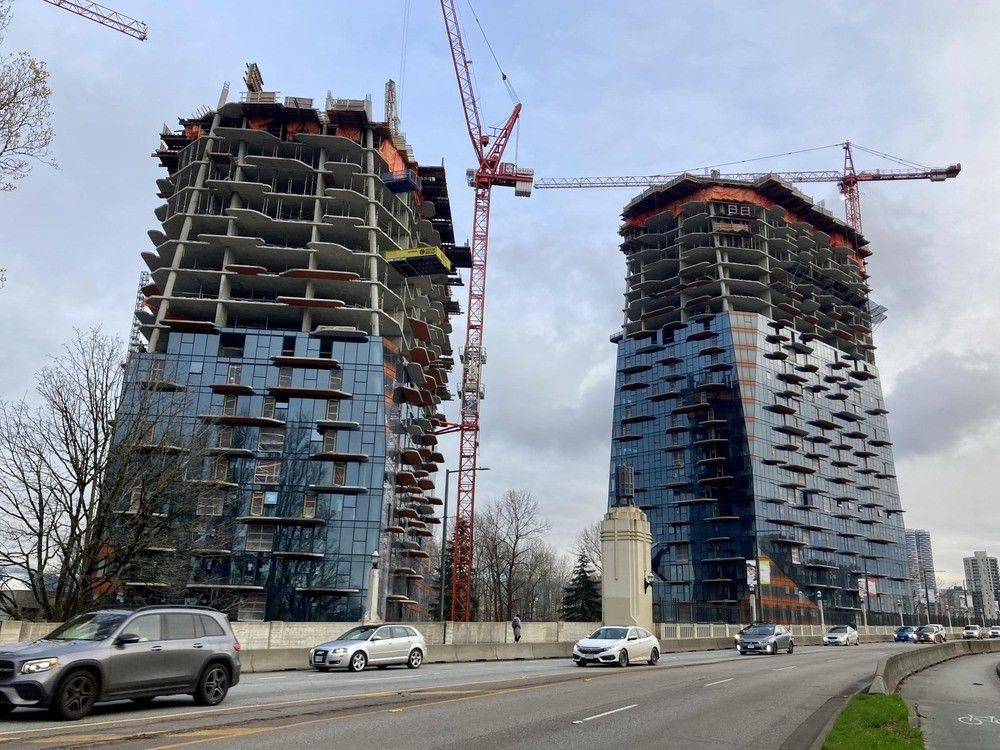
Just as all three towers of the Sen̓áḵw project’s first phase reached their full heights this week, Vancouver-based developer Westbank Corp. has sold its entire stake in the massive Squamish Nation housing development.
The Nation announced Thursday that OPTrust, one of Canada’s largest pension funds with net assets of over $26 billion, has acquired Westbank’s share in the first two phases as part of a restructured partnership.
Under the new arrangement, OPTrust (the Ontario Public Service Employees Union and Government of Ontario pension fund) and the Squamish now share equal ownership of the first two towers, while the Nation has full ownership of Phases 3 and 4. It is calling the move “an unprecedented step toward self-sufficiency.”
“It means the Squamish Nation will fully own those phases of the project and the land underneath it. We can now make all the decisions about the future of these phases,” the Nation said in a statement.
Terms of the sale, including how much OPTrust paid for Westbank’s stake, have not been made public.
Westbank, which cut its stake in the Sen̓áḵw rental project from 50 per cent in 2019 to 30 per cent later on, has now left the project entirely. The high-profile developer was a key partner since the project broke ground in 2022, with a $1.4-billion federal construction loan.
All three towers in Phase 1 topped out at 27, 32, and 40 storeys this week and are expected to open next year with more than 1,400 new homes, the Nation said.
Tsur Somerville, a professor at UBC’s Sauder School of Business, said there are several possible reasons for Westbank’s decision.
“One reason could be that they have a need for equity because they’re facing a variety of financial challenges,” he said. “Another could be that they just want to reduce their stake in Vancouver rental and allocate capital somewhere else, to reduce their exposure.”
Somerville added that bringing more than a thousand rental units to market all at once, the number expected to open in Phase 1 next year, comes with risks.
“From a risk perspective, they are arriving at the market when rental growth has slowed and market rents are starting to drop a little bit,” he said. “It’s going to take time to lease all of that.”
When finished, the multi-building Sen̓áḵw development is planned to deliver 6,000 rental units on Squamish Nation land in Vancouver’s Kitsilano neighbourhood, half of them financed by Ottawa’s loan.
The project, located on the site of an ancient Squamish village occupied by the Canadian Pacific Railway a century ago and returned to the Nation in 2003 by the Federal Court of Canada, was hailed as one of the largest First Nations economic developments in Canadian history by former Vancouver Mayor Kennedy Stewart.
Retired architect and planner, Vancouver’s Michael Geller, believes the Canadian developer’s decision to sell its stake in Sen̓áḵw “definitely reflects on Westbank’s financial situation.”
Professor at UBC Sauder School of Business Thomas Davidoff believes that Westbank, like other developers, likely needs funds to cover debts from projects struggling during the current market downturn.
“Like other developers, Westbank needs cash to pay off debts associated with other projects running into difficulty in the market downturn that has unfortunately followed rising construction costs.”
However, in a statement to Postmedia on Friday, Westbank framed its exit from the project as a planned transition rather than a sudden retreat.
“From its early inception, Sen̓áḵw has always been envisioned as a capacity-building project for the Squamish Nation. The Nation has substantial land holdings and will be developing those lands for decades to come. From the outset, an important mandate of Sen̓áḵw was to help foster the development expertise that would allow the Nation to develop projects on their lands, whether on their own or in partnerships,” the statement said.
After the completion of the first phase, the Squamish Nation’s development group, Nch’ḵaý Development Corp., will take on “a greater leadership and oversight role in the Sen̓áḵw development,” with Westbank transitioning out, the developer said.
Last month, Westbank was one of about two dozen B.C. real estate developers who lobbied the federal government to reconsider rules restricting foreign ownership of residential property.
The letter highlighted that new housing starts in B.C. fell nearly 50 per cent between March 2024 and March 2025, causing some layoffs and delays on projects. It suggested the government look at Australia’s policy, which limits foreign buyers from purchasing existing homes but allows them to buy new homes and presales to support construction.
“Canada’s ban on foreign ownership was designed to help curtail the nation’s housing affordability crisis, but it has also negatively impacted overall investment into the new home industry,” the letter reads. It argued that foreign investors are an important part of the presale condo market and that without them, fewer projects would sell enough pre-construction units to get financing.
Founded by Ian Gillespie, Westbank is one of Vancouver’s leading developers, with a portfolio of buildings sold both locally and abroad, including Vancouver House and the five-million-square-foot Oakridge Park, which is set to be completed in 2027 in partnership with QuadReal Property Group.
— with files from The Canadian Press